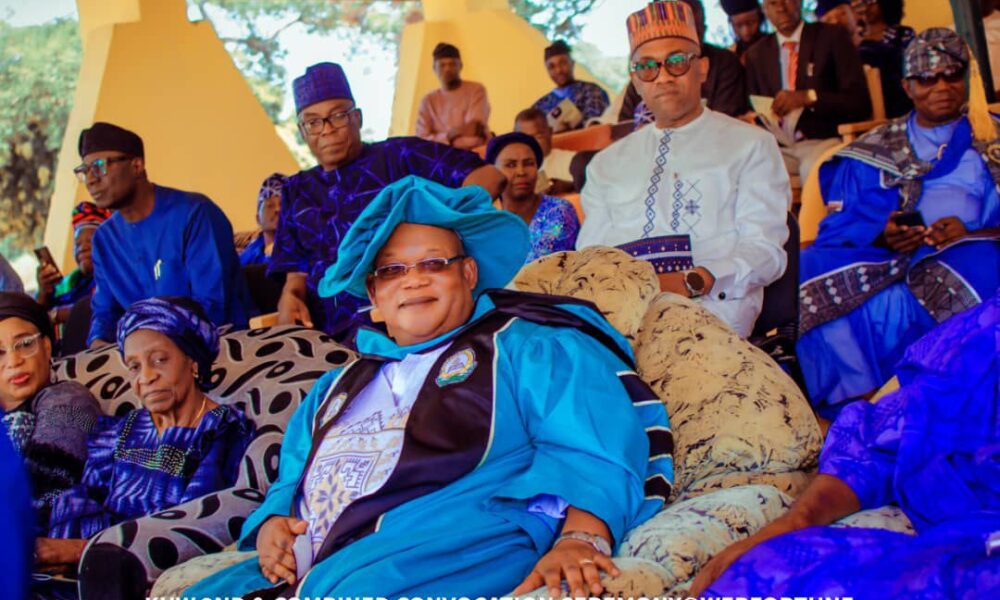By Eleojo Samuel, Jalingo
Taraba State is teetering on the brink of financial collapse amid allegations of widespread mismanagement and diversion of state resources under Governor Dr. Agbu Kefas.
With government activities at a standstill, the state treasury is reportedly empty, leaving essential services and infrastructure projects abandoned.
Governor Kefas’s conspicuous absence from the state for over three months has fueled speculations of a deep financial crisis.
Observers point to the suspension of all ongoing projects and the state’s ballooning debt profile as clear indicators of fiscal mismanagement. Despite securing over N250 billion in bank loans during his first 18 months in office—funds earmarked for critical infrastructure such as urban and rural roads, hospitals, and educational facilities—there is little to show in terms of tangible development.

While Governor Kefas has championed free education as a hallmark of his administration, critics argue this initiative is superficial, with many of its promised benefits remaining unfulfilled.
More alarming is the absence of any completed projects, including the failure to construct even a single kilometer of road since assuming office.
Sources revealed that despite the massive loans, contractors have abandoned key projects, including the remodeling of the Government House, the construction of a Trade Fair complex, and the renovation of state institutions like the College of Agriculture and the School of Nursing in Jalingo.
The much-touted Green House project, previously criticized as a conduit for siphoning public funds during former Governor Darius Dickson Ishaku’s tenure, has reportedly consumed over N2 billion under Governor Kefas, with little progress to justify the expenditure.
The question on every Taraban’s lips is simple: Where is the N250 billion? Allegations suggest the funds have “developed wings,” with some insiders claiming the money has been diverted for personal enrichment and political patronage. It is alleged that N100 billion of the loans were funneled back to Governor Kefas’s political godfather, a retired general from the state, as repayment for financing Kefas’s 2023 gubernatorial campaign.
Moreover, the state’s ability to meet basic financial obligations is under threat. The monthly deductions to service the massive loans have reportedly left insufficient funds to pay workers’ salaries, forcing the government to rely on overdrafts from commercial banks.
Investigations further reveal that allocations meant for the state’s 16 local government areas are being diverted to cover state-level debts. This includes the alleged misappropriation of N7.36 billion in federal intervention funds, initially intended for local governments but used instead to partially settle salary arrears for lecturers at Taraba State University, who had been on strike since November.
Another N2.3 billion, reportedly allocated for the purchase of 10,000 metric tons of grains for food security, has also gone missing, with no grains found in government warehouses. Despite introducing a new levy of N1,000 per grain bag to boost internally generated revenue (IGR), funds from this initiative are allegedly being siphoned by officials within the Ministry of Agriculture and the Board of Internal Revenue.
The agriculture sector, once seen as a beacon for diversifying the state’s economy, has not been spared from controversy. Over N2 billion allocated for the purchase of tractors last rainy season allegedly vanished, with only 30 tractors delivered as a token gesture. Similarly, funds earmarked for fertilizer distribution never reached farmers, further crippling agricultural productivity.
Accusations of complicity have been leveled against the Accountant-General’s Office, the State Ministry of Finance, and the Bureau for Local Government and Chieftaincy Affairs, suggesting a coordinated effort to divert public funds.
Facing mounting criticism, Governor Kefas addressed the allegations during an award presentation by the National Association of Nigerian Students (NANS) in Jalingo, where he was honored as a “Students’ Friendly Governor.” He dismissed his critics as impatient, stating, “I heard people complaining that I am not working and not executing projects. Such people are just in a hurry. What I am doing now is laying a foundation for incoming governors to build on.”
In response to the accusations, Hon. Emmanuel Bello, Senior Special Assistant on Media to the Governor, vehemently denied claims of financial mismanagement.
“Taraba is not broke. I don’t know how anyone can say that. Our IGR has improved considerably due to the hard work of the sagacious governor and his team,” Bello stated. He insisted that ongoing projects had not been abandoned but were undergoing technical reevaluation.
“This is the year of infrastructural development in roads and bridges. Our 2025 budget reflects this commitment,” he added.
Despite these reassurances, the people of Taraba remain skeptical, demanding transparency and accountability from an administration they once believed held the promise of transformation. With the specter of direct federal allocations to local governments looming, many wonder how Governor Kefas will navigate the growing financial quagmire without further eroding public trust.




